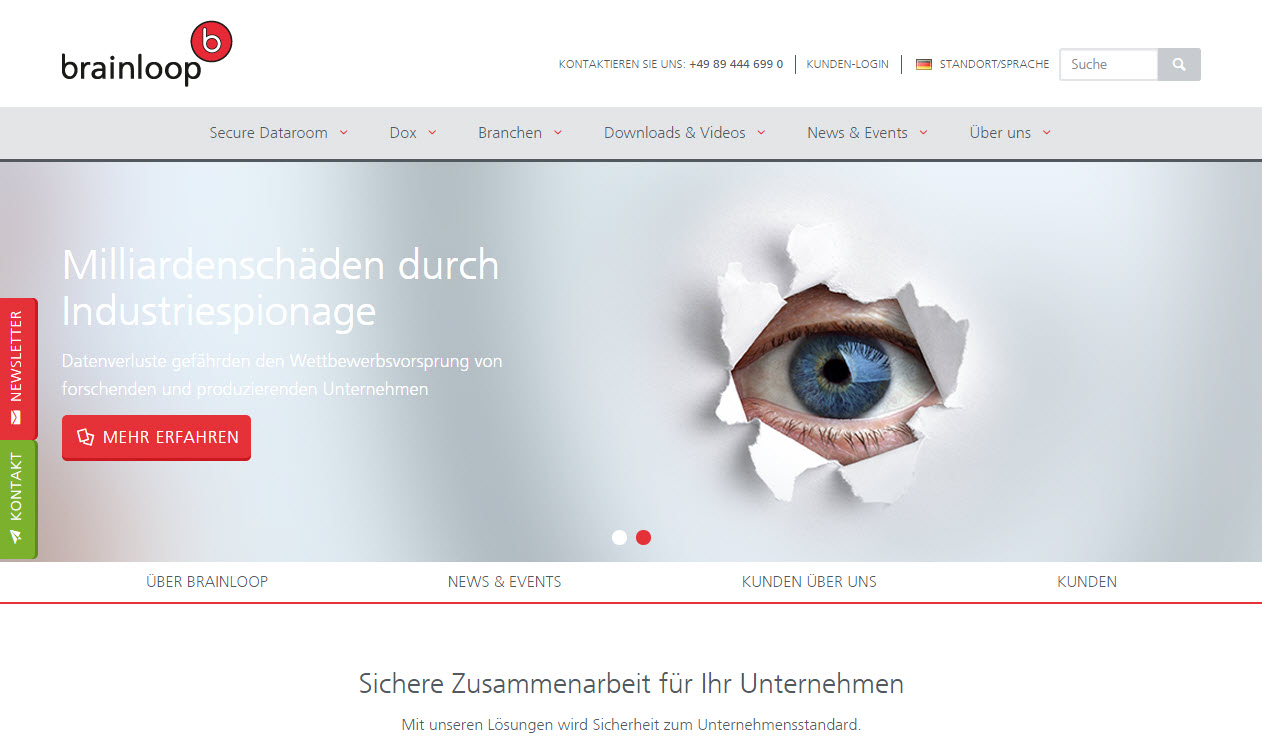The "Dropbox disease
On the way to a meeting: A few key company figures need to be compiled quickly or a contract with a key customer needs to be edited. The files in question are to be sent to all participants. Often the easiest way is to upload them to Dropbox and send the link, possibly with an obvious subject line so that everyone knows what it's about. In the worst case, "everyone" also means uninvited readers.

"Protecting intellectual property is also a concern for SMEs. But for lack of alternatives, they often manage highly confidential documents via Dropbox." Gabriel Gabriel, Managing Director of Brainloop Switzerland AG
Insecure public clouds
Naïve who proceeds in this way? In many cases, nothing actually happens. Nevertheless, Gabriel Gabriel, Managing Director of Brainloop Switzerland AG, speaks of a "dropbox disease" that is spreading right up to the highest corporate bodies. He points out: "The protection of intellectual property also concerns SMEs. But for lack of alternatives, they often manage highly confidential documents via Dropbox." But there, you never know exactly in which country and on which server the data is currently stored. For cost reasons, these are often places where data protection regulations - if they exist - are handled rather casually. On the one hand, this is an invitation to data theft, and on the other, legal action in the event of a case becomes an expensive, if not impossible, matter. Solutions offer more security here, which function like a familiar cloud service, but store the data on local servers and can protect it from unauthorized access through encryption.
"Like Secure Dataroom, Dox is also Outlook and IBM Notes ready and allows access from a wide variety of devices."
Collaboration in the secure "Dataroom
The Munich-based company Brainloop has taken up exactly this cause: Cloud solutions that meet the highest security requirements. One such solution is the Secure Dataroom. This is a web-based collaboration solution that is particularly popular with board members in Germany for secure communication and document processing. Documents can be exchanged among participants via an app that functions as a sandbox. The files can also be read offline. The documents always remain in the Dataroom and can only be accessed via a link. And what should be of particular interest to local companies: The data is stored on servers in Switzerland, but can also be stored "on premise", i.e. for a private cloud, at the customer's request. This is particularly useful for large customers. "Our customer Raiffeisen Switzerland recently switched from the cloud to an on-premise solution operated and maintained by us," Gabriel tells us. "It allows the individual cooperatives to collaborate securely with external parties."
Against the "Dropbox disease
Brainloop maintains its own servers and data centers in all countries in which it operates. "Brainloop Dox is an attractive service, especially for SMEs, and is an enterprise file sync and share (EFSS) solution. Based on Secure Dataroom, it was explicitly developed for mass access and is therefore exceptionally well suited for SMEs. "Like Secure Dataroom, Dox is also suitable for Outlook and IBM Notes and allows access via a wide range of devices," Gabriel adds. In principle, Brainloop Dox works similarly to Dropbox, but has far higher security standards while adhering to compliance guidelines. And here, the data is stored in Switzerland. The costs - storage space is virtually subscribed to - are comparatively low: "From 22 francs per space and month, you're in with Brainloop Dox. A cost of 440 francs per month for a company with 20 employees, for example, is a small investment compared to the level of security offered," says Gabriel.
Residual risk "human factor"?
Are the systems described here really that safe? Because ultimately, the "human factor" always plays a role. Gabriel: "The human factor can certainly be controlled. If, for example, a document classified as strictly confidential is to be shared with other users, this can only be done with our solutions if the authorization to do so is stored in the system. And that can't be bypassed."
Conclusion of the editors
If you have been looking for a secure file sharing solution for a long time, you should have found a user-friendly, easy-to-implement product in Brainloop Dox. Sensitive corporate information can be shared and processed far more risk-free than with "open" public clouds.
brainloop https://www.brainloop.com/de-de/
About Brainloop
Brainloop was founded in 2000 and offers solutions for cross-departmental online collaboration on confidential information and documents within the company and with external service providers. The company has national subsidiaries in the UK, France, Austria, Switzerland and the USA. Brainloop Switzerland is based in Zug and is led by Managing Director Gabriel Gabriel. Brainloop now has numerous customers in Switzerland, including Raiffeisen Schweiz and Elektrizitätswerke Zürich EWZ. With its Brainloop Dox solution, the company is aiming for major growth among small and medium-sized enterprises as well.









